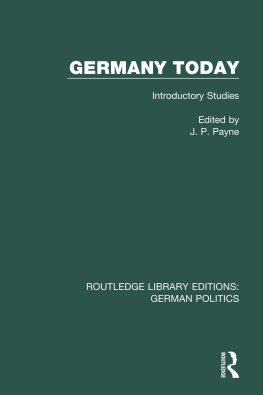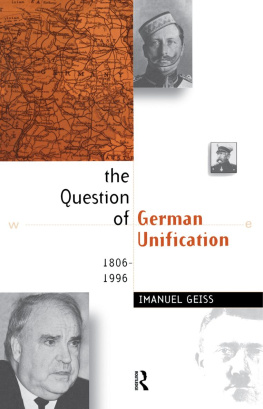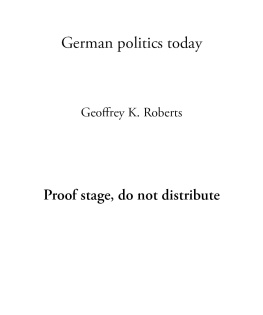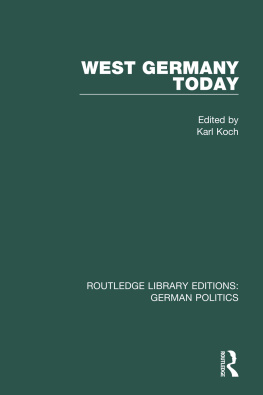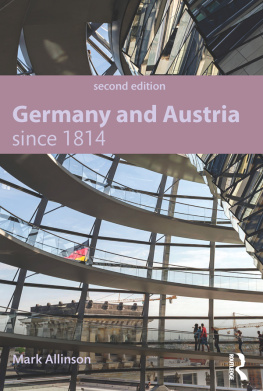ROUTLEDGE LIBRARY EDITIONS: GERMAN POLITICS
Volume 13
GERMANY TODAY
Germany Today
Introductory Studies
Edited by
J. P. Payne
First published in 1971
This edition first published in 2015
by Routledge
2 Park Square, Milton Park, Abingdon, Oxon, OX14 4RN
and by Routledge
711 Third Avenue, New York, NY 10017
Routledge is an imprint of the Taylor & Francis Group, an informa business
1971 Methuen & Co Ltd
All rights reserved. No part of this book may be reprinted or reproduced or utilised in any form or by any electronic, mechanical, or other means, now known or hereafter invented, including photocopying and recording, or in any information storage or retrieval system, without permission in writing from the publishers
Trademark notice : Product or corporate names may be trademarks or registered trademarks, and are used only for identification and explanation without intent to infringe.
British Library Cataloguing in Publication Data
A catalogue record for this book is available from the British Library
ISBN: 978-1-138-83837-6 (Set)
eISBN: 978-1-315-72630-4 (Set)
ISBN: 978-1-138-84788-0 (Volume 13)
eISBN: 978-1-315-72635-9 (Volume 13)
Publishers Note
The publisher has gone to great lengths to ensure the quality of this reprint but points out that some imperfections in the original copies may be apparent.
Disclaimer
The publisher has made every effort to trace copyright holders and would welcome correspondence from those they have been unable to trace.
Germany Today
Introductory Studies
Edited by J. P. PAYNE
Methuen & Co Ltd
11 New Fetter Lane, London E.C.4
First published 1971 by Methuen & Co Ltd
11 New Fetter Lane, London E.C.4
1971 Methuen & Co Ltd
Printed in Great Britain by
Richard Clay ( The Chaucer Press ) Ltd
Bungay, Suffolk
SBN ( hardbound ) 416 20260 8
SBN ( paperback ) 416 20270
This title is available in both hardbound and paperback editions. The paperback edition is sold subject to the condition that it shall not, by way of trade or otherwise, be lent, re-sold, hired out, or otherwise circulated without the publisher's prior consent in any form of binding or cover other than that in which it is published and without a similar condition including this condition being imposed on the subsequent purchaser.
Distributed in the U.S.A.
by Barnes & Noble Inc.
Contents
| R. CECIL |
Reader in Contemporary German History at the
University of Reading |
| R. B. TILFORD |
Senior Lecturer in German Regional Studies at the
University of Surrey |
| J. P. PAYNE |
Assistant Professor in German at Erindale College,
University of Toronto |
The Structure of German Society after the Second
World War |
| J. FIJALKOWSKI |
Professor at the Institute for Political Science,
Free University, Berlin |
Germany: Economic Developments, Problems
and Policies |
| M. E. STREIT |
Volkswagen Lecturer in Economics at the
University of Reading |
| W. MEYER-ERLACH |
Assistant Professor in German at Erindale College,
University of Toronto |
Anyone interested in the study of the German Federal Republic and the German Democratic Republic cannot complain about shortage of information. Quite apart from being able to go and see for himself what Germany is like he can choose from among the host of German newspapers and periodicals which are available abroad, he can read the work of Germans and foreigners on present-day Germany, he can avail himself of the facilities of German cultural centres throughout the world, he can listen to radio and television broadcasts either from Germany or about Germany.
No one would doubt that it is valuable to have so much information at one's disposal. Sheer quantity is however no guarantee of quality. Even if a student of Germany abroad regularly reads a German newspaper, has he thereby provided for himself an adequate source of information about the contemporary German scene? What reservations must he have in mind if, for example, this source is Der Spiegel ? Does the editor have a particular axe to grind? Are his reports biased? If one is confronted with the statement that the West German 'economic miracle' came about through the German people's capacity for hard work and this is quite likely in the course of one's reading will one be able to measure this statement against the actual economic conditions that prevailed during the period of recovery? If one learns that the German social security system is one of the most advanced in the world, will one be able to make a mental reservation about the unbalanced distribution of wealth?
The problem is that questions such as these require some familiarity with issues spanning several disciplines which may deter the student by the unfamiliarity of their method and the strangeness of their vocabulary. Although their views are of decisive influence in the development of advanced industrial societies, the economist and the sociologist, for example, tend to present their arguments in language which was not coined with the layman in mind. Yet without a minimum of familiarity with the problems that concern the economist, the sociologist and experts in other fields of knowledge, it is impossible for the individual to organize his work on Germany and form his own balanced critical opinion on contemporary issues. The present book, written by experts from different fields and with different interests, attempts to provide the basis for an understanding of issues which affect the daily life of Germans in the GFR and the GDR. The various authors have formulated their ideas with the general reader in mind; the individual articles range over a wider variety of problems and the method of presentation is less specialized than would be the case in articles written for scientific journals in the respective fields. However, the standards of accuracy and objectivity they seek to uphold are no less rigorous.
The subjects covered include some of the most important aspects of the development of modern Germany. Germany has become one of the clearest examples of the effects of the Cold War, the division of Germany reflecting the deadlock of the world powers. R. Cecil, a historian, examines this crucial and extraordinarily complex problem. Since the turn of the century Germany has had a rapid succession of different modes of government: monarchy, pluralistic democracy, fascism and yet another form of pluralistic democracy. R. B. Tilford, a political scientist, examines how West Germans have adjusted to the latest mode of government. Those who have been to Berlin have experienced at first hand the extent to which recent history has affected the lives of the average German. J. Fijalkowski, a sociology professor, who lives in Berlin, is admirably placed to examine the forces which shape the lives of the citizens of the GDR as well as those of the GFR. His contribution covers a wide range of issues from house-purchase to old-age pensions. M. E. Streit, who has worked on the professional staff of the Council of Economic Advisers to the German Government, has been involved at first hand with the running of an economy whose problems many a Western country would gladly exchange for its own. W. Meyer-Erlach and myself, both literary critics with a deep interest in contemporary Germany, examine, respectively, the present cultural and educational 'scene', and the press.

